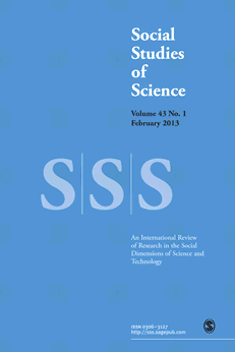
SOCIAL STUDIES OF SCIENCE
metrics 2024
Illuminating the Social Fabric of Scientific Endeavors
Introduction
The SOCIAL STUDIES OF SCIENCE, published by SAGE PUBLICATIONS LTD, is a prestigious academic journal that has been at the forefront of interdisciplinary research since its inception in 1971. With an ISSN of 0306-3127 and an E-ISSN of 1460-3659, this journal serves as a vital platform for exploring the complex interactions between science, technology, and society. Well-recognized in the academic community, it boasts an impressive impact factor and is ranked in the Q1 quartile within major categories such as History, History and Philosophy of Science, and General Social Sciences, placing it in the top echelons of its field. Scopus rankings further emphasize its significance, notably achieving rank #9 out of 1760 in Arts and Humanities for History and a 99th percentile rank. This journal encourages Open Access for maximized outreach, although specific open access options are currently limited. The SOCIAL STUDIES OF SCIENCE is essential for researchers, professionals, and students alike, aiming to foster a deeper understanding of how scientific practices shape, and are shaped by, societal dynamics.
Metrics 2024
 1.01
1.01 2.90
2.90 4.20
4.20 106
106Metrics History
Rank 2024
Scopus
IF (Web Of Science)
JCI (Web Of Science)
Quartile History
Similar Journals

NanoEthics
Unraveling the Socio-Ethical Dimensions of NanotechnologyNanoEthics is a pioneering journal published by Springer, dedicated to exploring the complex intersections of nanotechnology and ethical considerations. With an ISSN of 1871-4757 and an E-ISSN of 1871-4765, this influential journal has steadily progressed since its inception in 2007, sustaining high academic standards and relevance through 2024. It is notably positioned in the Q1 category for History and Philosophy of Science and Philosophy, reflecting its significant impact in these disciplines, and holds commendable rankings in several other categories, including Social Sciences and Management of Technology and Innovation. With its commitment to fostering rigorous dialogues and interdisciplinary research, NanoEthics serves as an essential platform for researchers, professionals, and students engaged in understanding the socio-ethical dimensions of nanoscience. The journal's comprehensive scope invites contributions that challenge conventional paradigms, encouraging innovative thought leadership in the realms of technology and ethics.

East Asian Science Technology and Society-An International Journal
Navigating the Future: Science, Technology, and Society in East AsiaEast Asian Science Technology and Society - An International Journal, published by Taylor & Francis Inc, is a premier interdisciplinary platform focusing on the dynamic interplay between science, technology, and society in East Asia. Since its inception in 2008, this journal has established itself as a critical resource in the field, holding a distinguished position with an impact factor that reflects its relevance and contribution within the Q2 quartile of Social Sciences (miscellaneous) as of 2023. Researchers and scholars are invited to explore comprehensive analyses, case studies, and theoretical insights that address significant socio-technological challenges and developments unique to the region. Although currently not open access, articles are accessible to institutional subscribers, facilitating the dissemination of knowledge among professionals and students alike. With a Scopus rank of #114 out of 275 in General Social Sciences and a resilient engagement with ongoing academic discourse, the journal is your gateway to understanding trends that shape the future of East Asian societies.
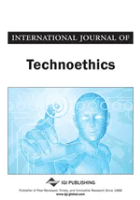
International Journal of Technoethics
Navigating the crossroads of technology and ethics.International Journal of Technoethics, published by IGI Global, stands at the forefront of interdisciplinary research, bridging the fields of technology, ethics, and society. With an ISSN of 1947-3451 and an E-ISSN of 1947-346X, this celebrated journal focuses on the critical examination of ethical issues emerging from technological advancements, propelling discourse among researchers, professionals, and students alike. Since its inception in 2010, it has thrived in esteemed categories, boasting a Q2 ranking in both Engineering (miscellaneous) and Social Sciences (miscellaneous), with impressive Scopus rankings placing it in the top 12% and 27% within these fields respectively. With the aim of fostering a deeper understanding of technology's impact on society, the journal provides a platform for scholarly articles, case studies, and comprehensive reviews, contributing significantly to the global conversation on technoethics. Published from the United States, International Journal of Technoethics is pivotal for those seeking to navigate the complexities of innovation while maintaining a strong ethical foundation.

Sociologia Nauki i Tehnologij-Sociology of Science & Technology
Exploring the Nexus of Society, Science, and TechnologySociologia Nauki i Tehnologij-Sociology of Science & Technology is a distinguished journal dedicated to exploring the intricate relationships between science, technology, and society. Published by the Institute of History of Science and Technology, Saint Petersburg Branch, Russian Academy of Sciences, this journal serves as a vital platform for interdisciplinary research and discourse within the fields of sociology, science studies, and technology assessment. The journal encourages contributions that delve into the societal implications of scientific advancements and technological innovations, making it essential reading for researchers, professionals, and students alike. Although specific impact factors and access options are currently not provided, the journal is committed to maintaining high academic standards and fostering a rich scholarly community. Join us in advancing the understanding of how science and technology shape human experiences across diverse contexts.

Mindanao Journal of Science and Technology
Bridging Science and Technology for a Better TomorrowMindanao Journal of Science and Technology is an esteemed multidisciplinary journal published by the University Science & Technology Southern Philippines. With an ISSN of 2244-0410 and an E-ISSN of 2449-3686, this journal aims to foster academic discourse and innovation in the fields of science and technology in the Philippines and beyond. While it is categorized as Q3 in the multidisciplinary field for 2023, it demonstrates the journal's commitment to quality research as reflected in its Scopus rank, which places it at the 39th percentile. The journal, encompassing research across diverse scientific disciplines, is a vital resource for researchers, professionals, and students intent on contributing to the body of knowledge and addressing contemporary scientific challenges. You can access insightful articles and current research trends that span various scientific explorations from 2019 to 2024, making it an essential platform for scholars dedicated to advancing technology and science within and outside the Mindanao region.
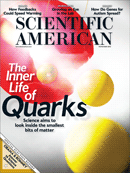
SCIENTIFIC AMERICAN
Bridging Science and Society Since 1947SCIENTIFIC AMERICAN, published by Springer, stands as a prestigious multidisciplinary journal dedicated to disseminating cutting-edge scientific knowledge across a range of fields. Established in 1947, this journal has been integral in bridging the gap between scientific research and public understanding, making complex ideas accessible to a broader audience. With an ISSN of 0036-8733 and E-ISSN of 1946-7087, it maintains a strong standing within the academic community, currently ranked in the Q3 category for its multidisciplinarity, and is positioned at #93 out of 120 in its Scopus ranking, reflecting its valuable contribution to scientific discourse. While the journal is not open access, its long history and commitment to knowledge sharing ensure it remains a vital resource for researchers, professionals, and students alike, fostering a deeper appreciation of science in society.

European Journal for Philosophy of Science
Elevating Academic Discourse in Philosophy and ScienceThe European Journal for Philosophy of Science, published by SPRINGER, stands as a prestigious platform for scholars in the realms of philosophy and history of science. With an impressive impact factor and categorized in the Q1 Quartile for both History and Philosophy of Science and Philosophy, this journal ranks among the top 10% of its peers, reinforcing its critical role in advancing academic discussions and insights within these fields. With its composition of rigorous peer-reviewed articles and a commitment to fostering interdisciplinary dialogue, the journal navigates foundational and contemporary issues that shape scientific inquiry. Although currently not Open Access, it provides invaluable access to researchers, professionals, and students who seek to deepen their understanding of the philosophical underpinnings of scientific practice. Housed in the Netherlands, the journal continuously engages with the evolving landscape of philosophy in the scientific domain, making it a key resource for anyone invested in the intersection of science and philosophy.
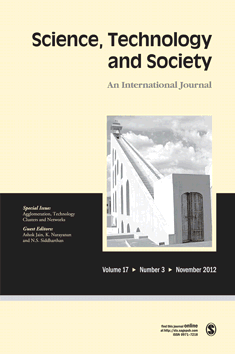
Science Technology and Society
Connecting Research with Real-World ImplicationsScience Technology and Society is a premier multidisciplinary journal published by SAGE Publications India Pvt Ltd, focusing on the intersection of scientific advancements and societal implications. With its ISSN of 0971-7218 and E-ISSN of 0973-0796, the journal is recognized for fostering scholarly discourse and critical analyses from diverse perspectives, serving as a vital resource for researchers, professionals, and students alike. With a distinguished Q1 category ranking in the multidisciplinarity discipline and an impressive 79th percentile among 171 journals, it stands out for its rigorous peer review process and impactful contributions to the field. The journal has been in continuous publication from 1996 to 2004 and from 2006 to 2024, underlining its ongoing relevance and commitment to exploring how technology shapes society and vice versa. Although currently offering subscription access, it remains dedicated to providing researchers with innovative insights that bridge gaps between technology and social contexts, making it an essential addition to the academic community's libraries.

Perspectives on Science and Christian Faith
Navigating the Nexus of Faith and Empirical TruthPerspectives on Science and Christian Faith is a distinguished journal published by the American Scientific Affiliation, focusing on the intersection of science and theology. With an ISSN of 0892-2675, this journal aims to provide a platform for scholarly discourse on how Christian faith interacts with scientific inquiry, addressing philosophical, ethical, and practical implications of this relationship. As an essential resource for researchers, professionals, and students in both scientific and theological fields, it encourages innovative perspectives and critical analysis to foster a deeper understanding of how faith and science can coexist and enrich one another. Although it operates under a subscription model, the journal remains deeply committed to promoting an engaging dialogue among its readership, contributing to the ongoing conversation about faith in the context of contemporary scientific developments. With its focused mission, Perspectives on Science and Christian Faith is instrumental in exploring vital issues that resonate with the spiritual and intellectual pursuits of its community.
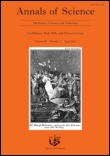
ANNALS OF SCIENCE
Charting the Course of Scientific Ideas Through TimeANNALS OF SCIENCE, published by Taylor & Francis Ltd, is a pivotal journal in the field of the History and Philosophy of Science, as evidenced by its Q3 categorization and a respectable Scopus rank of 99 out of 223, placing it in the 55th percentile among its peers. With a rich history dating back to its initial publication in 1936, the journal has made significant contributions to scholarly discourse, providing a platform for researchers and academics to explore the intricate connections between scientific developments and philosophical inquiries. The journal's commitment to rigorous academic research ensures that it remains a vital resource for professionals, educators, and students dedicated to understanding the evolution of scientific thought. Although it operates under traditional subscription models, the journal's importance in shaping modern scientific discussions cannot be overstated, making it an essential read for those engaged in the multifaceted study of science's history and philosophical implications.